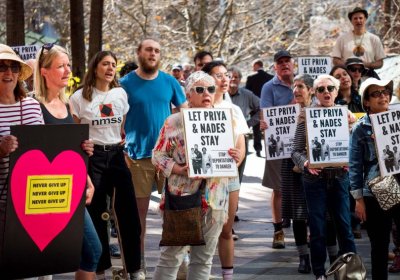Chris Slee reviews a new documentary showing how British mercenary company Keenie Meenie Services trained a notorious Sri Lankan government paramilitary force, responsible for the torture and murder of Tamil civilians.
Sri Lanka
The situation for Tamils in Sri Lanka is likely to worsen, writes Chris Slee, after the Sri Lanka Peoples Front, a right-wing alliance headed by Prime Minister Mahinda Rajapaksa, won 145 seats in Sri Lanka's 225 member legislature in the August 5 elections.
The Sri Lankan government has used the COVID-19 pandemic as an excuse for increased repression of the Tamil people, writes Chris Slee.
A state of fear is being re-established in Sri Lanka ahead of snap elections, writes Chris Slee.
Gotabaya Rajapaksa, regarded by many Tamils as a war criminal, won the Sri Lankan presidential election on November 16 with 52.3% of the vote.
He was defence secretary in 2009, when the Sri Lankan armed forces massacred tens of thousands of Tamils in the final stages of their war against the Liberation Tigers of Tamil Eelam (LTTE). The LTTE were fighting for an independent Tamil homeland in the north and east of the island of Sri Lanka.
Losing Santhia: Life & Loss in the Struggle for Tamil Eelam
By Ben Hillier
Interventions, 2019
150 pages
In 2009, the Sri Lankan military launched a genocidal offensive against the island's Tamil population on a stretch of sand in Mullivaikal, in the island's north-east.
Claiming its offensive was to rescue civilians, the Sri Lankan military carried out an indiscriminate bombing offensive against Tamil civilians that killed tens of thousands.
A new report shows why Tamil refugees fear being sent back to Sri Lanka, and why it is essential to campaign against the Australian government's policy of deporting them or pressuring them to return "voluntarily", writes Chris Slee.
The following speech was given by Barathan Vidhyapathy, from the Tamil Refugee Council, outside the Federal Court hearing into the fate of the Tamil family of Priya and Nades and their two Australian-born daughters, in Melbourne on September 19.
The family, who had lived in Biloela, Queensland, for four years before they were put in a Melbourne immigration detention centre in March last year, is being threatened with deportation to Sri Lanka.
Sri Lanka has a long history of discrimination against Tamils. In 1948 Tamil plantation workers were deprived of citizenship. In 1956 Sinhalese was made the sole official language, denying the Tamil language equal status, writes Chris Slee.
More than 500 Tamil demonstrators tried to march to the site of a destroyed Hindu temple at Kanniyaa in the Trincomalee district of Sri Lanka on July 16.
The Sri Lankan army and police have used the bombings of churches and hotels on Easter Sunday as a pretext for repression, targeting people who have no connection with the group responsible, the National Thowheed Jamath (NTJ – National Monotheism Society).
The NTJ, an extremist Islamic group, is believed to be linked to the Islamic State, based in Iraq and Syria.
Sri Lankan police have been raiding numerous Muslim groups with "Thowheed" in their name, even if they are opposed to the NTJ. As of May 2, at least 130 Muslims had been detained, according to Tamilnet.
Sri Lanka has had a violent history in the seven decades since its independence in 1948. But this history did not include any major conflict between Muslims and Christians. Both Muslims and Christians have in recent years come under attack from Buddhist chauvinists. Why then, did the bombers target Christians?
- Previous page
- Page 3
- Next page











